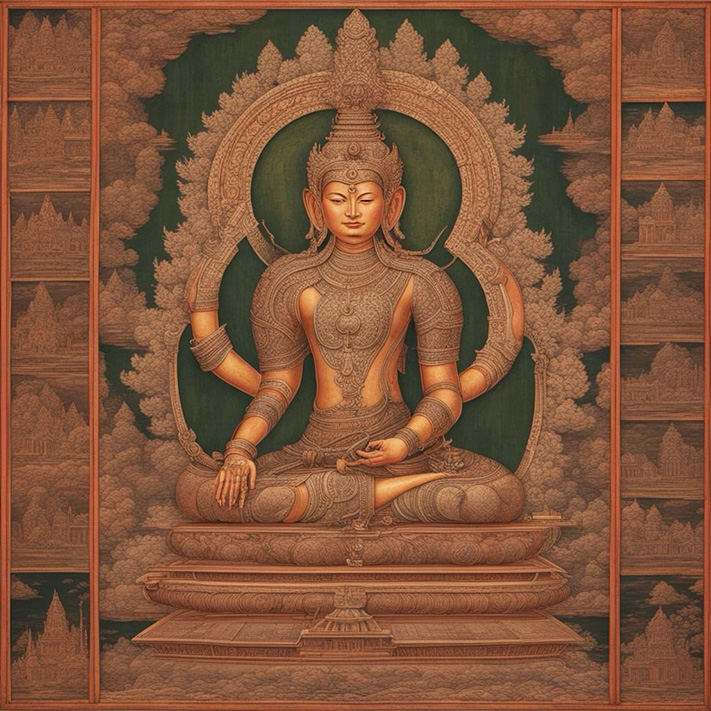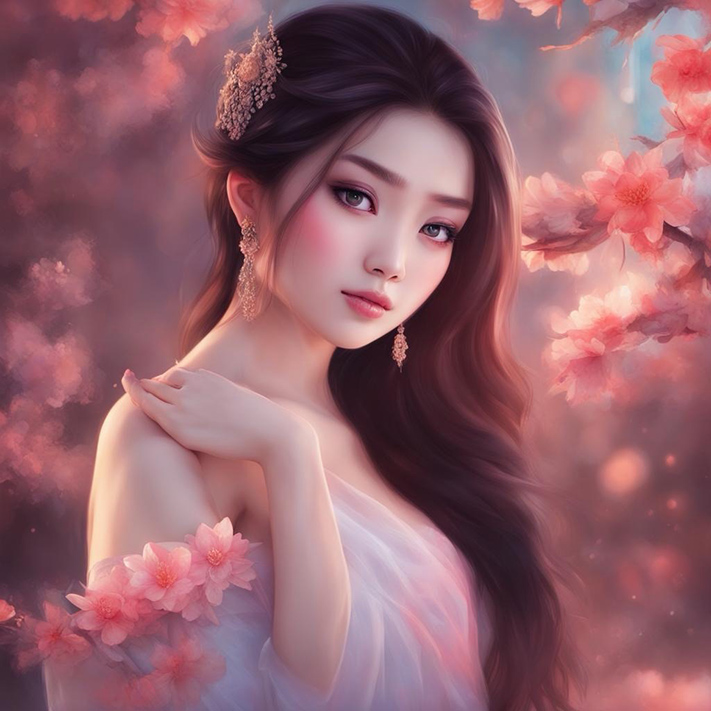Title Thumbnail: Kṛṣṇa and Radha, Hero Image: Kṛṣṇa and calvs at Vṛndāvana, source: pinterest.com, access date: Feb.16, 2024.
F. Introduction: The Bhagavad Gītā
First revision: Feb.16, 2024
Last change: Mar.18, 2024
Searched, Gathered, Rearranged, and Compiled by Apirak Kanchanakongkha.
43 (Cont.)
7. The Individual Self
Reality is, in its own nature, infinite, absolute, untramelled, inalienably possessed of its own unity and bliss. In the cosmic process, dualities and oppositions which obscure the infinite undivided reality arise. In the terms of the Taittirīya Up., the cosmic process has assumed the five stages of matter2. (anna), life (prāṇa), mind (manas), intelligence (vijñāna) and bliss (ānanda). There is an inner direction given to things by reason of their participation in the creative onrush of life. The human being is at the fourth stage of vijñāna or intelligence. He is not master of his acts. He is aware of the universal reality which is operating in the whole scheme. He seems to know matter, life and mind. He has mastered, to a large extent, the material world, the vital existence and even the obscure workings of mentality but has not yet become the completely illumined consciousness. Even as matter is succeeded by life, life by mind and mind by intelligence, even so the intelligent man will grow into a higher and divine life. Progressive self-enlargement has been the impulse of nature. God’s purpose for the world or the cosmic destiny for man is the realization of the immortal aspiration through this mortal frame, the achievement of the Divine life in and through this physical frame and intellectual consciousness.
The Divine dwells in the inmost being of man and cannot be extinguished. It is the inner light, the concealed witness, that which endures and is imperishable from birth to birth, untouched by death, decay, or corruption. It is the principle of jīva, the psychic person which changes and grows from life to life and when the ego is completely harmonized by the Divine, it ascends into spiritual existence which is…
---------------
2. Literally food.
44
its destiny and until this happen it travels between birth and death.
All forms of existence are found in each being for, under the well-fixed traits of the human form, are the contours of materiality, organization and animality. The matter, life and mind that fill the world are in us well. We partake of the forces that work in the outer world. Our intellectual nature produces self-consciousness; it leads to the emergence of the human individual from its original solidarity with nature. The security which he derives from the instinctive adherence to the group is lost and has to be regained at a higher level without the elimination of his individuality. By the integration of his self, his unity with the world has to be achieved in a spontaneity of love and unselfish work. Arjuna, in the opening scene, faces the world of nature and society and feels utterly alone. He does not wish to buy inward security by submission to the social standard. So long as he looks upon himself as a kṣatriya required to fight, so long as he is chained to his station and its duties, he is unaware of the full possibilities of his individual action. Most of us, by finding our specific place in the social world, give a meaning to our life and gain a feeling of security, a sense of belonging. Normally, within limits, we find scope for the expression of our life and the social routine is not felt as a bondage. The individual has not yet emerged. He does not conceive of himself except through the social medium. Arjuna could have overcome his feeling of helplessness and anxiety by submitting completely to the social authority. But that would be to arrest his growth. Any sense of satisfaction and security derived by submission to external authority is bought at the price of the integrity of the self. Modern views like the totalitarian declare that the individual can be saved by his absorption into society. They forget that the group exists only to secure the complete unfolding of human personality. Arjuna disentangles himself from the social context, stands alone and faces the perilous and overpowering aspects of the world. Submission is not the human way of overcoming loneliness and anxiety. By developing our inner spiritual nature, we gain a new kind of relatedness to the world and grow into the freedom, where the integrity of the self is not compromised.
45
We then become aware of ourselves as active creative individuals, living, not by the discipline of external authority but by the inward rule of free devotion to truth.
The individual self is a portion of the Lord,1 a real, not an imaginary form of the Supreme, a limited manifestation of God. The soul which derives from the Supreme Īśvara is not so much an emanation as a member of the Supreme. It draws its ideal from this superior principle which is like a father who has given it existence. The soul’s substantial existence springs from the Divine intellect and its expression in life is effected by virtue of its vision of the Divine who is its father and its ever-present companion. Its distinctiveness is determined by the divine pattern and the context of the senses and the mind which it draws to itself. The universal is embodied in a limited context of mental – vital-physical sheath.2 No individual is quite like his fellow; no life repeats another and yet a single pattern runs through them all. The essence of the ego, the distinguishing characteristic of human personality is a certain creative unity, an inner purposiveness, a plan which has gradually shaped itself into an organic unity. As our purpose is, so is our life. Any form which the individual assumes is bound to be superseded, for he always tries to transcend himself and this process will continue till becoming reaches its end in being. The jīvas are movements in the being of God, individualized. When the ego is lost in a false identification with the not-self and its forms, it is bound; but when through the development of proper understanding, it realizes the true nature of the self and its forms, it is bound; but when through the development of proper understanding, it realizes the true nature of the self and not-self to be illumined completely by the self, then it is freed. This realization is possible through the proper functioning of buddhi or vijñāna.
The problem facing man is the integration of his personality, the development of a divine existence in which the spiritual principle has the mastery over all the powers of soul and body. This integral life is created by the spirit. The distinction between soul and body which links man with the life of nature is not an ultimate one. It does not exist in the radical sense in which Descartes affirmed it.
---------------
1 XV, 7. Many names are given to this divine essence of the soul – apex, ground, abyss, spark, fire, inner light.
2 XIII, 21.
46
The life of the soul permeates the life of the body, even as the bodily life has its effect on the soul. There is a vital unity of soul and body in man. The real dualism is between spirit and nature, between freedom and necessity. In the integrated personality we have the victory of the spirit over nature, of freedom over necessity. The Gītā which looks upon both these as aspects of the Supreme, affirms that we can spiritualize nature and communicate another quality to it. We need not crush or destroy nature.
The problem of freedom vs. determinism has meaning only with reference to human individuals. It has no application to the Absolute which is above all opposites or to the subhuman species of plants and animals. If man is but the simple creature of instinct, if his desires and decisions are only the resultants of the forces of heredity and environment, then moral judgments are irrelevant. We do not condemn the lion for its ferocity or praise the lamb for its meekness. Man is the possessor of freedom.1 After describing the whole philosophy of life, the teacher asks Arjuna to do as he chooses.2 The whole teaching of the Gītā requires man to choose the good and realize it by conscious effort. There are however many impediments to this freedom of choice.
Man is a complex multi-dimensional being, including within him different elements of matter, life, consciousness, intelligence and the divine spark. He is free when he acts from the highest level and uses the other elements for the objective nature, when he does not recognize his distinction from not-self, he becomes a slave to the mechanism of nature. But, even when he falsely identifies himself with the objective universe, and feels that he is subjected to the necessities of nature, he is not without hope, for the One Spirit operates at all levels of being. Even matter is a manifestation of the Supreme. There is an element of spontaneity and creativity inexplicable in terms of mechanical forces even in the lowest forms of nature. Each plane of our being has its own consciousness, its surface thoughts, its habitual ways of feeling, thought and action. The ego should not persist in retaining its obscure and limited consciousness, which is a distortion of its true nature.
---------------
1 svatantraḥ kartā.
2 XVIII, 63.
47
When we subdue the senses and keep them under control, the flame of spirit burns bright and clear “like a lamp in a windless place.” The light of consciousness stands in its own nature and the empirical self with its shifting tides of experience is controlled by buddhi in which is reflected the light of consciousness. Then we rise above the play of prakṛti and see the real self from which creative forces arise; we cease to belong to that which is moved about and are no more helpless tools of nature. We are free participants of the world above into the world below.
 Image obtained from the "Chat Smith (GPT-4) AI" program on March 1, 2024.
Image obtained from the "Chat Smith (GPT-4) AI" program on March 1, 2024.
 Image obtained from the "Chat Smith (GPT-4) AI" program on March 1, 2024.
Image obtained from the "Chat Smith (GPT-4) AI" program on March 1, 2024.




